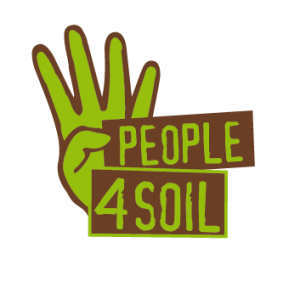Phosphorus, the forgotten crisis; the solutions – People4Soil Campaign

[cs_content][cs_section parallax=”false” style=”margin: 0px;padding: 45px 0px;”][cs_row inner_container=”true” marginless_columns=”false” style=”margin: 0px auto;padding: 0px;”][cs_column fade=”false” fade_animation=”in” fade_animation_offset=”45px” fade_duration=”750″ type=”1/1″ style=”padding: 0px;”][cs_text class=”cs-ta-right”]9th February 2017[/cs_text][cs_text class=”cs-ta-justify”]Phosphorus depletion is one of the most important dilemmas facing the world. Our modern agriculture system has led us down a  deeply unsustainable path, which we must diverge from.
deeply unsustainable path, which we must diverge from.
Phosphorus is essential to plants in the same way it is essential to people. Phosphorus is found in every plant cell and allows for growth to occur. Plants rely upon healthy soil to acquire phosphorus and other essential nutrients. If the soil is void of phosphorus, plants struggle to grow, are more prone to disease and may eventually die.
Traditionally, after plants were consumed,phosphorus was returned to the soil in the form of animal and human waste, forming a cycle. Most modern agriculture no longer uses animal and human waste, and instead uses chemical fertilisers to replenish the soil’s nutrients. Waste products are now sent to treatment plants in place of being returned to the land. Eventually this waste, along with the phosphorus it contains, is lost to the oceans and landfill, further driving phosphorus depletion. We have effectively broken a natural cycle which has kept our soil healthy for thousands of years.
Other issues also contribute to phosphorus depletion, such as our inefficient use of fertilisers, reliance on crop types requiring soil with high phosphorus content and food waste.
In order for us to combat phosphorus depletion we must adapt our agriculture systems and society, here’s how we do it:
Reduce food waste and compost more
According to UNEP, over a third of food produced is wasted each year, amounting to a staggering 1.3 billion tonnes. Most of this food ends up in landfill, representing a massive waste of inputs, including phosphorus. By making smarter consumer choices, reducing what we throw away and by putting pressure on producers to cut “between farm and fork” waste, we can make a substantial difference to our demand on phosphorus from chemical fertilisers.
It’s not realistic to think that food waste can be entirely wiped from existence, there will always be some. What we are left with, we should compost as opposed to allowing it end up in landfill. By composting, we ensure that the phosphorus contained within food waste is returned to the soil.
Reuse animal and human waste as a natural fertiliser
In Ireland manure from livestock, which is rich in phosphorus, is still widely used in agriculture. However, at a global level it is estimated only 50% of phosphorus consumed by livestock is returned to the soil where food is grown. We must better avail of animal waste in agriculture to reduce our dependence on chemical fertilisers. For countries like the US, this means turning away from industrial farming and back to pasture, thus allowing phosphorus return to the soil where it came from.
Human waste is also rich in phosphorus. The World Health Organisation believe urine alone contains enough phosphorus to support half the world’s cereal production. Currently most human waste is lost to landfill and the oceans. If we are serious about combating phosphorus depletion this is another resource we must utilise in place of chemical fertilisers.
More efficient use of chemical fertilisers
The United Nations FAO estimate only 30% of Phosphorus contained in fertilisers ends up in crops. The most simple explanation for this is excessive use of chemical fertiliser. The correct amount of fertiliser to use is difficult to determine and depends on a range of factors from soil conditions to geography. Often, farmers don’t know the correct amount of fertiliser to use on their land, this is especially true in developing countries. In order to combat inefficient use, we must provide farmers with better knowledge and education on fertiliser application.
Embrace nature
A huge amount of phosphorus is lost to streams, rivers and lakes through runoff from the land. Riparian zones, vegetation along river edges, act as natural barriers to runoff. Plants in the riparian zones soak up excess phosphorus and in doing so prevent it being lost from the soil.
Certain crops require less phosphorus in the soil than others, we must pay better attention to this and choose crops best suited to the natural soil conditions, which will result in less need to apply chemical fertilisers.
Protect soil health by signing the People4soil petition
In order to prevent phosphorus depletion we must break our reliance on chemical fertilisers. Protecting and maintaining healthy soil is key to our efforts. It might surprise you to learn currently there are no EU laws specifically protecting soil. People4soil is a European Citizens’ Initiative with the sole purpose of doing just that, protecting our soil. A European Citizens’ Initiative is an invitation to the European Commission to propose legislation. It has to be backed by at least one million EU citizens, coming from at least 7 out of the 28 member states. By signing the People4Soil petition you are helping us to protect our soil’s health and in doing so, reduce our dependence on chemical fertilisers and thus preventing phosphorus depletion.[/cs_text][x_gap size=”50px” class=”cs-hide-xs”][x_button size=”global” block=”false” circle=”false” icon_only=”false” href=”https://www.people4soil.eu/en” title=”” target=”” info=”none” info_place=”top” info_trigger=”hover” info_content=””]Click here to sign to the People4Soil petition [/x_button][x_author title=”About the Author” author_id=””][/cs_column][/cs_row][/cs_section][/cs_content]







